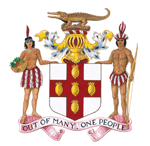Jamaican Nationals
Jamaican Diaspora
The Jamaican diaspora consists of Jamaicans who have migrated from the island, as well as their second and third generation descendants born overseas.
Over two million Jamaicans reside outside of Jamaica, with the overwhelming majority making a meaningful contribution to economic and social life in their new homes. It is estimated that over three hundred Jamaicans reside in Japan.
Whatever their initial reasons for migrating, the vast majority of Jamaicans abroad have never forgotten their roots. This is manifested in the high level of remittances and in the numerous charitable initiatives undertaken every year to help relieve pressing social and economic needs in Jamaica. The Jamaican Government has sought over the years to encourage a systematic and coordinated approach to the relationship with the Jamaican diaspora. One such initiative was the adoption in 1993 of the Charter for Long-Term Returning Residents, designed to facilitate the relocation and resettlement of Jamaicans who decide to return home.
Another important initiative of the Government of Jamaica is to link Jamaicans abroad with leaders in government, business, academia, industry, administration and non-governmental organizations to hear concerns and effect changes for Jamaicans both at home and abroad. This is done through National Diaspora Conferences and through the ongoing work of the Jamaica Diaspora Advisory Board, which works closely with the Ministry of Foreign Affairs and Foreign Trade of Jamaica. For further information on this subject, please refer to the following site:http://www.diaspora.org.jm/content/home/default1.asp
大使館登録申請書
Registration_Form_for_Citizen_of_Jamaica - Asia-Pacific region.doc
Returning Residents
The Jamaican Government has sought over the years to encourage a systematic and coordinated approach to the relationship with the Jamaican diaspora. One such initiative was the adoption of the Charter for Long-Term Returning Residents in 1993, designed to facilitate the relocation and resettlement of Jamaicans who decide to return home.
The focal point of the Government of Jamaica for matters related to Returning Residents is the Diaspora Affairs Department (DAD) of the Ministry of Foreign Affairs and Foreign Trade. For further information on procedures and regulations applicable to Returning Residents, please refer to the following handbook: returning-residents-information-booklet.pdf
Living, Working and Studying in Japan
Japan's unique culture, dynamic people and thriving economy make it an attractive destination for many foreigners interested in living, studying or working in Asia. However, it is important to note that persons who propose to live, work or study in Japan must be granted the relevant status of residence by the Ministry of Justice of Japan or the closest Japanese Embassy.
Categories of Residence
- Status of residence without restriction on work such as, permanent resident, spouse or child of Japanese resident, spouse or child of permanent resident, and long term resident;
- Status of Residence permitting work in specified occupations such as, diplomat, official, professor, artist, religious activities, journalist, investor,/business manager, researcher, legal/accounting services, engineer, entertainer, skilled labour, etc.;
- Status of residence NOT permitting work such as, temporary visitor, college student, trainee, dependents, etc.
For further information please refer to the following websites:
Ministry of Justice of Japan - www.moj.go.jp/ENGLISH/index.html
Tokyo Metropolitan Government - www.metro.tokyo.jp
Embassy of Japan in Jamaica - www.jamaica.emb-japan.go.jp
Living in Japan
For thousands of foreigners, the experience of living, studying and working in Japan is a unique, interesting and life-changing one, although there are always challenges to be overcome due to cultural differences and the language barrier.
There is an abundance of information on the internet on various aspects of life in Japan including on Japanese language schools, international schools, churches, employment opportunities, accommodation, places to visit, as well as activities for individuals, families and children. Free English magazines are becoming increasingly available at international supermarkets and other areas within and outside Tokyo, offering advice on living in Japan and advertising useful services and job opportunities for the foreign community. An English radio station, Inter-Fm is available on frequency 76.1FM.
Working in Japan
Jamaican nationals who are eligible to work may obtain information from the Tokyo Employment Service Centre for Foreigners. Assistance provided includes job counseling and placement, interpretation assistance, information on job offers, career forums for foreign students, consultations with advisors on immigration laws and visa procedures.
Service is available during the week between the hours of 8:30 a.m. and 5:00 p.m. Telephone: 03-3204 8609
Studying in Japan
There are a number of scholarships and other forms of assistance available to Jamaicans who are desirous of studying in Japan. Included among the programmes is the Japanese Government Scholarship (Monbukagakusho) Programme which was established in 1954.
Each year, the Ministry of Education, Culture, Sports, Science and Technology of Japan offers this scholarship to a Jamaican university graduate to conduct research at a Japanese university in a specified field. The scholarship is for a period of 18mths ? 2 years (including Japanese language studies) and is open to graduates under the age of 35 years with an interest in pursuing further studies in the area in which their first degree was completed. Application forms are available from the Japanese Embassy, Kingston and the deadline for applications is usually in May each year.
Additional information on studying in Japan may be obtained from the following websites:
Japan Student Services Organization - www.jasso.go.jp
Study in JAPAN Comprehensive Guide - www.studyjapan.go.jp
Japan Study Support - www.jpss.jp
Procedure for obtaining a Japanese Driver's Licence
Although Japan has a very efficient public transportation system, many persons residing here may consider driving a viable alternative to public transportation.
Some foreign nationals, including Jamaicans, are eligible to drive in Japan on an International Driving Permit/Licence for a period not exceeding one year. Jamaicans should obtain this permit from the Inland Revenue Department in Jamaica, prior to arrival in Japan. The individual should also be in possession of a valid Jamaican driver's licence.
Jamaicans residing in Japan may also obtain a Japanese driver's licence by applying to the Driver's Licence Centre of the prefecture in which they reside. Applicants must possess a valid Jamaican driver's licence and must be able to prove that they continued to live in Jamaica for at least three (3) months after obtaining the licence.
Applicants should obtain a Japanese translation of the driver's licence and submit this along with the following documents to the relevant Driver's Licence Centre in the prefecture of residence:
- Valid Jamaican driver's licence;
- Valid Passport;
- Resident card ( with registered domicile information) or alien registration card;
- One photograph (3.0 cm x 2.4cm);
- Application fee of \ 4,150;
Translations of Jamaican driver's licences may be done by the Japanese Automobile Federation (JAF) or by an official translation company. In the case of the latter, the translation should be submitted to the Embassy of Jamaica in Tokyo for authentication.
It is recommended that applicants contact the Driver's Licence Centre in their area for guidance prior to making the application.
The Japan Automobile Federation (JAF) publishes an English guide to driving in Japan called 'Rules of the Road'. These are available at JAF offices throughout Japan.
Japan Automobile Federation - www.jaf.or.jp
Advisory Services for Foreigners
As the number of foreigners has increased over the years, efforts are being made at various levels to provide services that may assist persons in making a much smoother transition to life in Japan. Unfortunately, many of these services are available only in Tokyo, but assistance may also be obtained from most City Councils and regional Immigration Bureaus, as well as from official government or municipal sites on the internet.
Foreign Residents' Advisory Centre
The Foreign Residents' Advisory Centre responds to enquiries and offers advice on a range of topics including, problems of daily life, Japanese customs and culture, family and personal problems and compensation for damages caused by traffic accidents.
Service is provided free of charge, Mondays to Fridays, and is also available in English. Consultation is usually over the telephone, although face to face consultations can be facilitated, with prior appointment. The contact details are as follows:
No.1 Building (3rd Floor)
Tokyo Metropolitan Government
2-8-1 Nishi-Shinjuku
Shinjuku-ku
Tokyo 163-8001
Tel. 03-5320-7744
Tokyo Metropolitan Health and Medical Information Service
The Tokyo Metropolitan Health and Medical Information Centre provides service to foreign nationals in a number of languages, including English.
The Medical Information Service is available daily from 9:00 a.m. ? 8:00 p.m. and provides information on medical facilities and practitioners, as well as an explanation of the Japanese medical system. Telephone # 03-5285 8181
The Emergency Interpretation Service (for medical institutions) is a telephone interpretation service which facilitates communication in cases where the absence of interpretation would otherwise prevent an institution from providing emergency care to a foreigner. The service is available on weekdays from 5:00 p.m. ? 8:00 p.m., and weekends from 9:00 a.m. ? 8:00 p.m. Telephone: 03-5285 8185.
Ministry of Justice - www.moj.go.jp/ENGLISH/index.html
Tokyo Metropolitan Government - www.metro.tokyo.jp
InterFM897 - www.interfm.co.jp
Japan Automobile Federation - www.jaf.or.jp
Trends in Japan - http://web-japan.org/trends/index.html

